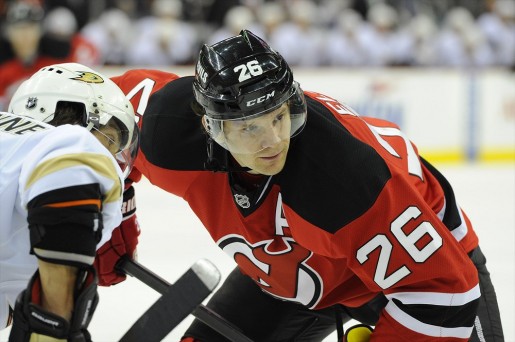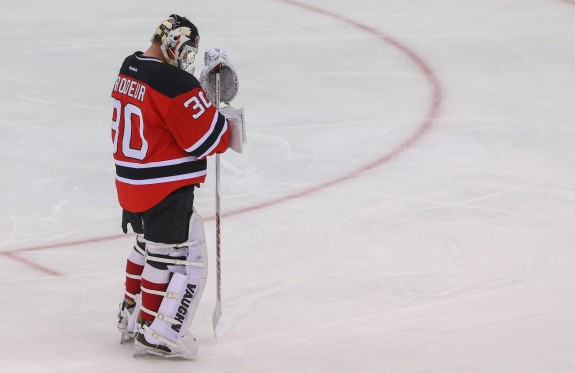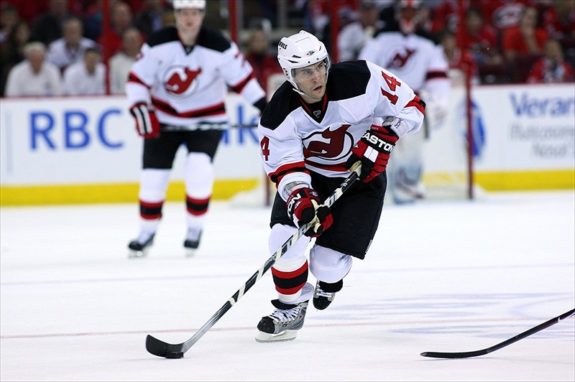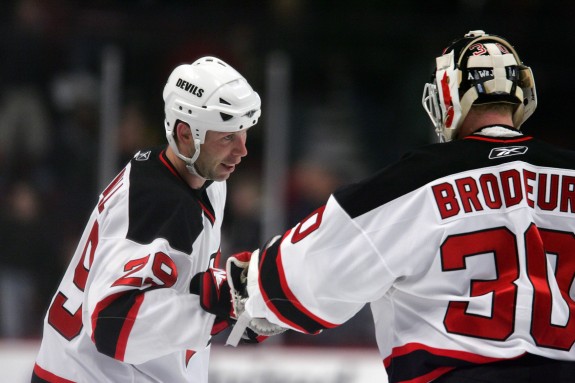What can be said about a man that everyone knows so much about? If you’re a fan of the NHL you likely know the Pat Burns story: A police officer for 17 years, three-time Jack Adams award winner (as coach of three different Original Six teams: Montreal, Toronto, Boston), a Stanley Cup champion with the 2002-03 New Jersey Devils. He passed away in 2010 after a battle with cancer before he was finally elected to the Hockey Hall of Fame in 2014 in the Builder category. Rather than write what everyone else will write now that Burns has posthumously made the HHOF, The Hockey Writers had been collecting quotes from some of his former players over the past two NHL seasons in anticipation of this moment; that was long overdue.

Before we delve into what four of his former players had to say about their coach, I wanted to share a little personal story about my first in person journalist experience around Burns as a rookie reporter/intern. It was Devils training camp in September of 2002 and the first day I accompanied Stan Fischler out in the field. It was freezing in the rink, which was mostly empty except a handful of reporters in the stands and the players on the ice. As I sat down on the cold, metal, bleacher-like bench (in razor-thin suit pants by the way) I began to focus on the drills on the ice and coach Burns was in a no-nonsense mood that day. This was his first season; his first camp with New Jersey and what I saw next was an immediate sign of respect from every player on that team. Captain Scott Stevens had messed up in one of the drills and Burns blew his whistle, stopping the drill and barked out some orders as all of the players turned their attention towards him. Stevens dropped down to the ice and began rolling around like a log, first to the left, then to the right; until Burns was satisfied and blew his whistle again, prompting Stevens to stand back up and the drill to resume.
But wait, there’s more. About five minutes later (different drill) Burns blew his whistle loudly again, halting the drill. This time it was Joe Nieuwendyk who had to drop to the ice; like Stevens earlier, he began rolling around on the ice like a log. One captain, one former captain; two former Conn Smythe Trophy winners — if these two future Hall of Famers were not getting any special treatment from the new coach, what was in store for the rest of the squad? You better believe everyone on that team from Stevens to Corey Schwab was on notice.
As a son of a police officer, I had a lot of respect for coach Burns, his methods and his style; I saw a lot of my father (who was battling cancer at that time in 2002) in him. In his three previous coaching stops in the NHL, Burns sported a thick mustache but once he arrived in New Jersey the ‘stache was gone. Under Lou Lamoriello’s reign with the Devils he has had a strict policy of no facial hair (until the playoffs of course) and Burns wanted the team know that he was one with them and would abide by his boss’ rules; again, no special treatment, for anyone.
During the 2013 lockout-shortened season and during the 2013-14 season THW spoke with four players who also have their names etched on the Stanley Cup from the 2003 Devils: Patrik Elias, Martin Brodeur, Brian Gionta & Grant Marshall. They all had unique relationships with Pat Burns, they all respected him so much and without question believed that he should be in the Hockey Hall of Fame.
Patrik Elias:
“Honestly, my time with him (as Devils coach) was probably my toughest time during my career with a coach. He was really hard on me, and I don’t think we had a good understanding with each other until probably the second year he was here. Then we found out what was happening with him (health-wise) and we started having a better relationship on the ice and off the ice. For most of the time before that it was really tough, we didn’t really see eye-to-eye on many things. I respected him and I still do; I look at it like it was a good experience, something to learn from. You have hurdles throughout your life and career and you just deal with it like a man.”

“I will always remember him from our championship team in 2003 though; never forget that. It shows me that there is more than one way to win the Stanley Cup: in 2000 we did it playing unbelievable hockey — offensively, defensively, great players. In 2003 we didn’t have as talented a team, but everybody clicked at the right time; different guys stepped up and performed or had an impact every night. That’s a testament to his coaching and influence on us.”
Martin Brodeur:
“Pat was a fun coach (for me), he made the game fun and he had a pretty good system. He’s the type of guy that demanded respect, he was an old cop; you could tell with his attitude — he could be really, really tough with you but when you talk to him on the side he was really, really nice. I got to know him really well when we won the Stanley Cup. Our families became friends and we rode motorcycles together, did a lot of different things.”
“It definitely was sad to see the end for him, the way it happened. He was a guy that really loved living and it was an unfortunate thing. As far as professionally, he was (always) getting the best out of the players.”
Brian Gionta:
“He’s one of the best coaches I’ve ever had; he gave me a great start in this league and I’m forever grateful for that. He’s just an honest coach that rewards you when you are doing the right things and playing the right way. Obviously he was our coach when we won the Stanley Cup in 2003, so I have great memories of him and we stayed in touch right until the end.”
Do you believe he should be in the Hall-of-Fame?
“(cuts me off) Oh for sure; for sure, for sure. I definitely think he should have been there before but still every year that goes by, it’s a disappointment when he’s not in there.”
Grant Marshall:
“For me, Pat was one of my favorite coaches that I’ve ever had. I think because of his personality, he fit with the style of player I think I was; which was not really flashy, it was I guess in your face, passionate and team oriented. A couple of great attributes Pat had were — he wasn’t shy; he was real. He spoke from the heart, told it like it was and the other thing was that he wasn’t afraid to give you crap – but at the same time he wasn’t afraid to tap you on the back and say ‘great job’. I think that’s a key attribute that a coach should have and the players should realize you’re going to get crap sometimes but also it’s okay that you’re going to get some praise as well; it goes hand-in-hand.”
“I think what he did when he came into Toronto, what he did in Boston, (laughs) Montreal; and also winning a Stanley Cup (here in New Jersey), doing well with all of those teams. Absolutely I think he should be in, what he meant to the game…I’ll bring it up again: he was a real, real man, a real coach; hardnosed, an old school style coach. He was the type of coach that would fight the players on the other team to protect his own players. I do believe he should be in the Hockey Hall of Fame, but I’m being very biased as well.”
“Some coaches will say ‘play hard, play hard, that’s all that matters’, some coaches say that and I don’t think it holds true; I hope it does. But with him it is true, he really recognized that he doesn’t care too much about skill, all he cares about is winning and how you do that. If you’re a hitter, you hit; if you’re a goal scorer, then you try to score. But the most important thing is you have to work hard and play for the guy next to you. That was he was really, really adamant and preached about.”
A nice video tribute to Pat Burns:
Hoping you all enjoyed this and maybe Pat Burns and my father are friends somewhere in the afterlife, doing cop things.
Dan Rice can be reached via Twitter: @DRdiabloTHW or via Email: drdiablo321@yahoo.com
* originally written in June 2014



